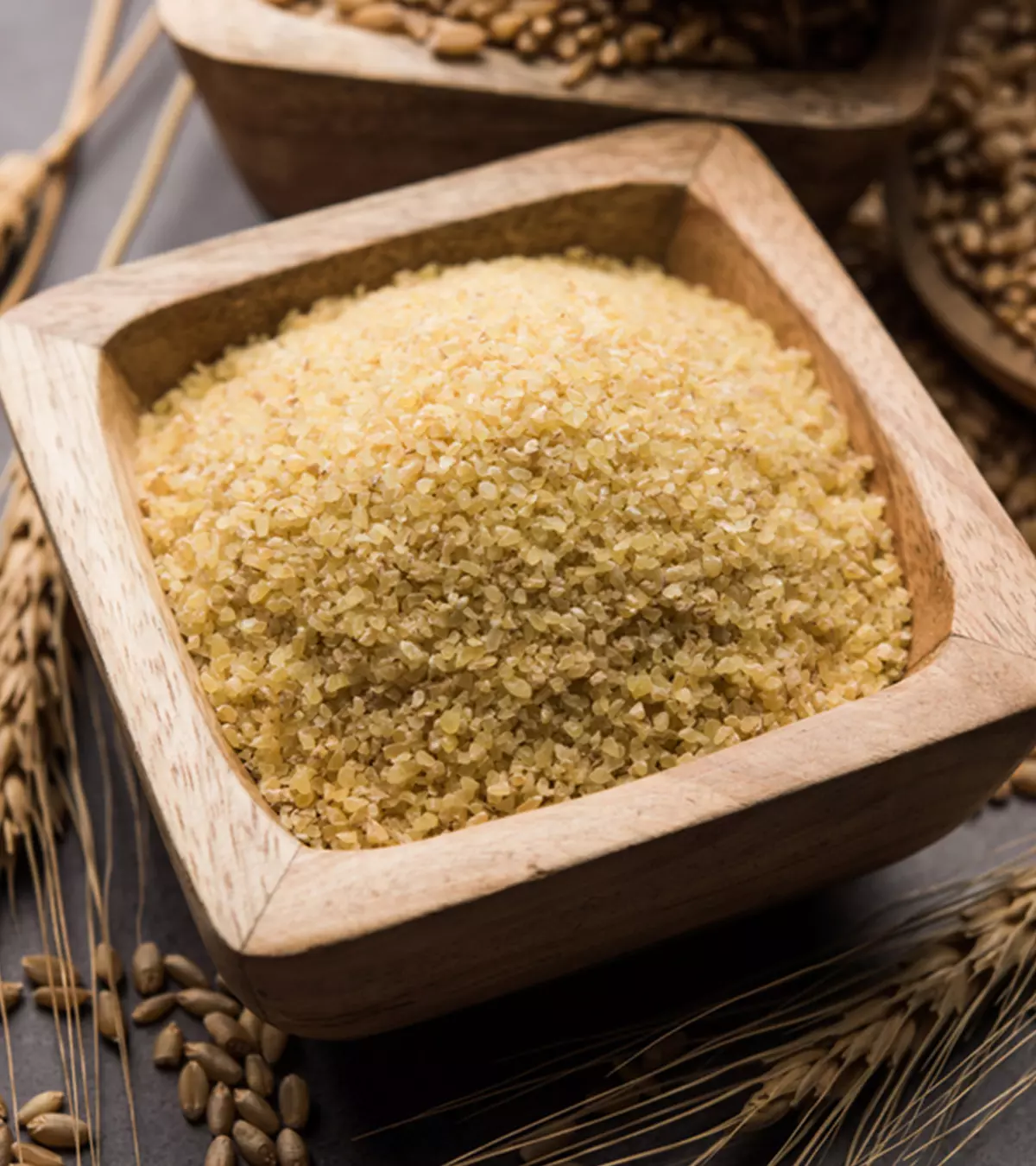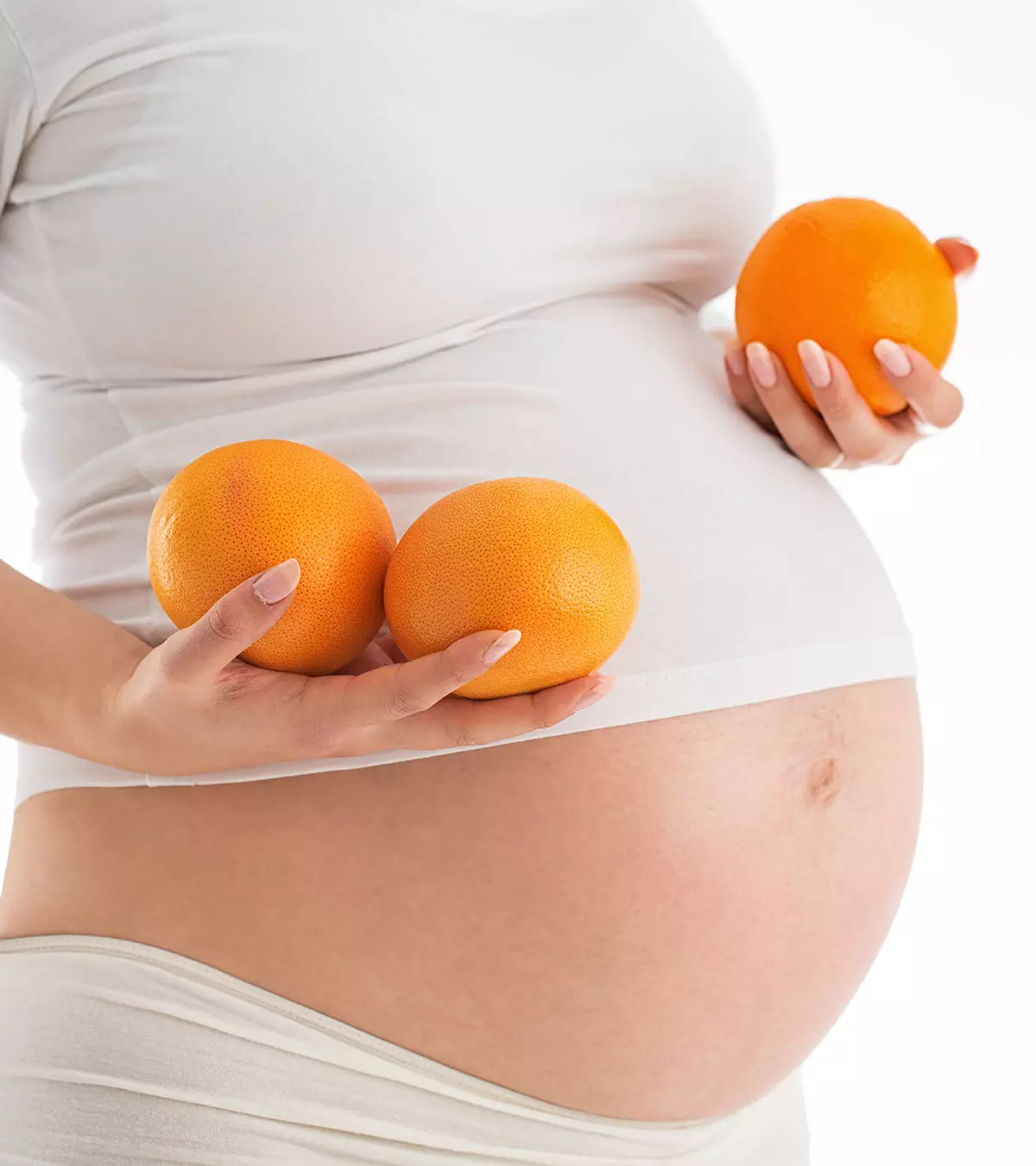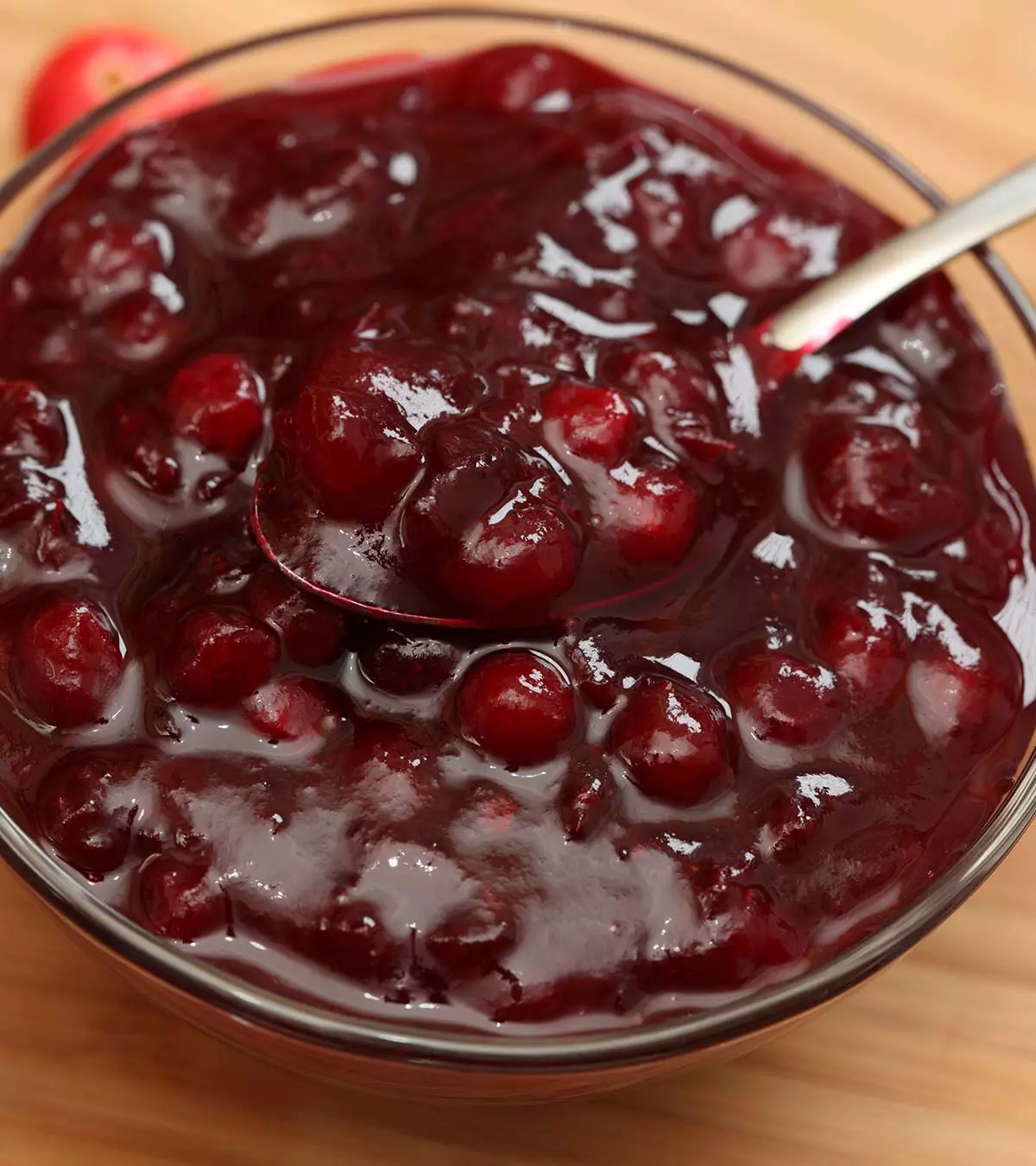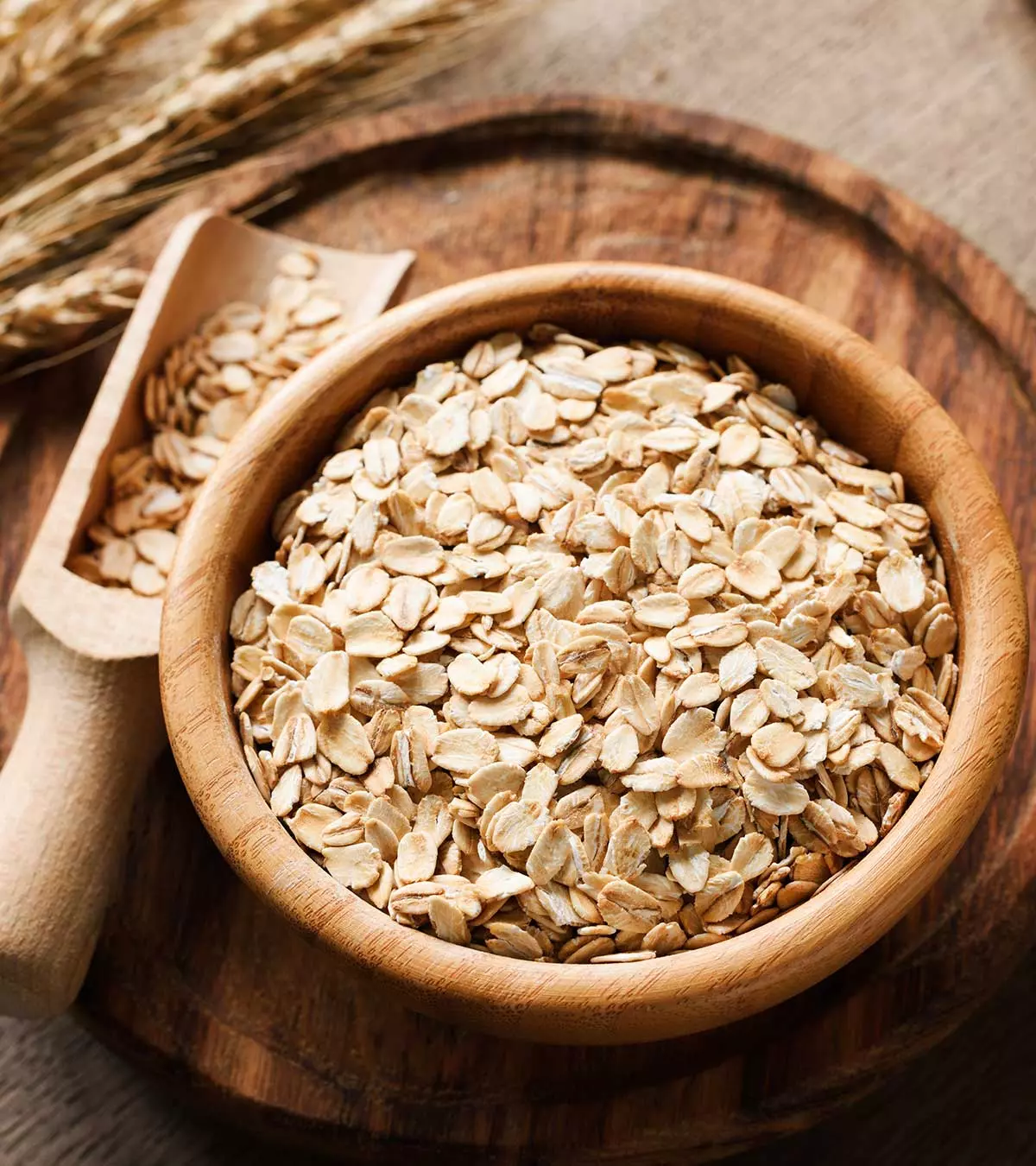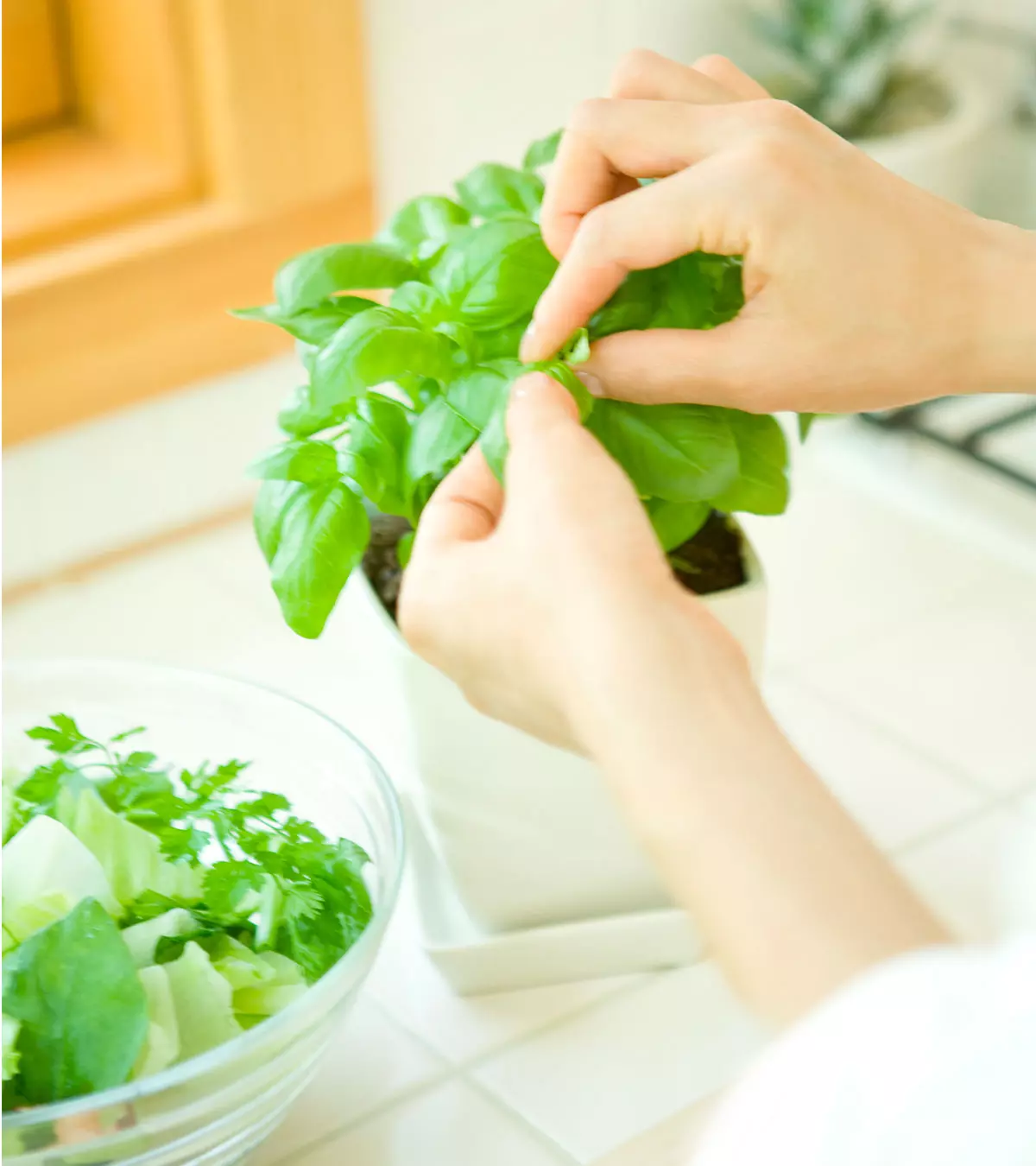
Image: iStock
Basil or tulsi is a herb known for its minty flavor and is frequently used in Italian recipes. Considering its wide usage in Italian cuisines, you may wonder if it is safe to consume tulsi in pregnancy. This herb has an intense flavor that enhances the taste of Italian food. It is also a part of many seasoning pre-mixes and is served freshly on pizza and pasta. Hence, it is difficult to avoid it completely. However, knowing this herb’s health benefits and risks could calm your concerns. Read on to know more.
Key Pointers
- Basil, a commonly used herb to add flavor to food, has medicinal properties and contains proteins, fibers, vitamins, minerals, and essential nutrients.
- Basil promotes fetal growth and development, prevents anemia, regulates blood clotting, and boosts immunity.
- Consume basil in moderation since overconsumption can lead to breathing difficulties, dizziness, seizures, and hypoglycemic effects.
- To reduce the risk of food-borne illnesses, thoroughly wash Basil leaves before consumption.
What Is Basil?
Basil is a popular herb used in Ayurvedic medicine with antimicrobial, anti- oxidant, and anti-inflammatory properties. It possesses anti-diabetic properties, which may help in blood sugar control. Additionally, it may aid in maintaining digestive health (1). The green aromatic leaves of the herb add a punch of great flavor to soups, salads, and many other cuisines. Also, basil is high in nutrition and contains many proteins, vitamins, fiber, minerals, and other essential nutrients. (2).
Health Benefits Of Consuming Basil During Pregnancy
1. Helps regulate blood clotting
Basil provides a good amount of vitamin K, which plays a vital role in ensuring your good health and your unborn baby’s safety during pregnancy. Vitamin K helps clot blood and prevents the risk of blood loss (3).
2. Promotes fetal growth and development

Image: Shutterstock
Basil is rich in vitamin A, which ensures appropriate growth and development of the fetus. Vitamin A from the herb promotes heart, eyes, lungs, and central nervous system development (4).
3. Supports Formation Of Fetal Bones
The manganese content in basil helps form your unborn baby’s bones and cartilage. Also, manganese acts as a powerful antioxidant that minimizes oxidative stressiAn unbalanced ratio of antioxidants to free radicals in the body leading to cell damage and prevents the risk of cellular damage in pregnant moms (5).
4. Ensures healthy blood supply
The folate content of basil helps generate additional blood that you need during pregnancy. Also, folate prevents the risk of certain birth defects in the unborn baby (4).
5. Prevents anemia
Basil is an excellent source of iron. Iron helps promote a good hemoglobin count and boosts your red blood cell count (RBCs) during pregnancy. According to the World Health Organization (WHO), anemia affects approximately 37% of pregnant women. Therefore, incorporating basil into your meals can be a natural medicine to prevent the risk of anemia in expectant mothers. Additionally, tulsi provides the necessary energy and helps ward off fatigue (5).
6. Boosts immunity ensuring a healthy pregnancy

Image: Shutterstock
Basil is a rich source of several vitamins, such as vitamin E, vitamin C, riboflaviniNatural form of Vitamin B2, essential for body metabolism and beneficial for brain, eyes, and skin health , niaciniA natural form of vitamin B3 employed in various processes such as energy metabolism, cell growth, and function , and many other vitamins. Also, the herb is a good source of minerals namely, zinc, phosphorus, magnesium, copper, manganese, and potassium. All vital vitamins and minerals in basil provide immune system support against many infections, ensure your good health and optimal development of the unborn baby, and help you enjoy a healthy pregnancy (6). Tulsi also aids in stress relief and reducing depression and anxiety (1).
7. Reduces aches and pains
According to Ayurveda, tulsi leaves are considered beneficial for alleviating pain associated with headaches and migraines. A decoction of tulsi leaves is believed to be a natural remedy for headaches. Additionally, applying a paste of pounded tulsi leaves and sandalwood paste on the forehead is thought to offer relief from headaches (7). Scientific studies suggest that topical application of essential oil made from basil may have the potential to reduce both the intensity and frequency of migraine attacks (8). Furthermore, it is reported to have properties that relieve stomach and abdominal pain (9). However, scientific evidence supporting the use of tulsi specifically for pain relief during pregnancy is limited.
 Quick Tip
Quick TipSide Effects Of Eating Basil During Pregnancy
Even though there are several health benefits of eating basil while pregnant, an excess of consumption of the herb can result in side-effects. Here are two main side effects of the herb.
1. Causes health troubles
Eugenol, the oil present in the basil, can prove hazardous to health if you eat an excess of basil. The oil in the herb can lead to speeding heartbeats, throat and mouth burns, shallow breathing, seizuresiSudden and abnormal surges of electrical activity in the brain characterized by jerking body movements and loss of consciousness , dizziness, blood in the urine, and comaiA state of being in a deep and prolonged state of unconsciousness, usually due to a medical ailment in extreme cases (3).
2. Results in severe hypoglycemic effects

Image: Shutterstock
Excess consumption of basil in pregnancy can result in serious hypoglycemic effects minimizing your blood sugar levels. As a result, you may suffer from dizziness, irritability, and shaking (10).
Some other side effects of eating basil or taking its supplements may include gastrointestinal discomfort, high blood pressure, allergic reactions, and possible drug interactions.
A Word Of Caution
 Quick Tip
Quick TipBasil is safe to consume during pregnancy, however, make sure you consume it in appropriate amounts and not in excess. Also, pregnant women should wash the herb before consuming it since unwashed basil may contain harmful parasites and bacteria that can lead to food-borne infections and ailments, such as listeriosisiFood-borne bacterial infection in pregnant women characterized by diarrhea and fatigue, and flu-like symptoms and toxoplasmosisiParasitic infection often caused by consumption of contaminated raw meat or exposure to cat feces during pregnancy . Consult your doctor for prenatal care once before you start eating basil while pregnant (11). Also, too much basil can potentially interact with medication. Therefore, it is best to avoid taking basil or its supplements if you take any medications, such as blood pressure medications, during pregnancy (6).
Frequently Asked Questions
1. Does basil induce labor?
Sufficient scientific evidence is unavailable to suggest that having basil alone when pregnant can induce labor.
2. Can I eat basil pesto while pregnant?
Consuming pesto during pregnancy can be a flavorful addition to your diet that contains the goodness of basil, pine nuts, garlic, cheese, and olive oil (12). You can consume pesto with sandwiches or nachos. Alternatively, you can pair it with veggie salad, pizza, or pasta.
3. Can tulsi be harmful to the developing fetus?
Some traditional sources and animal studies share that purple tulsi may have uterine-stimulating effects. However, insufficient scientific evidence exists to determine whether tulsi adversely affects the developing fetus. Therefore, more targeted studies and clinical trials are needed to know if tulsi has any adverse effects on the unborn baby (13).
4. Can tulsi be used as a natural remedy for morning sickness?
While tulsi is believed to possess antiemetic properties (ability to alleviate nausea and vomiting), its safety and efficacy for morning sickness have not been thoroughly studied in pregnant women (1). Therefore, it is advisable to consult a healthcare provider for appropriate remedies for morning sickness.
5. Are there any studies or clinical trials on the safety and efficacy of tulsi during pregnancy?
There is a lack of comprehensive studies and clinical trials focusing on the safety and efficacy of tulsi during pregnancy. The available research on tulsi pertains to its general health benefits and limited studies on non-pregnant individuals.
Basil or tulsi is an aromatic herb that possesses several medicinal properties and is used in herbal remedies. Most healthy women can safely consume basil during pregnancy. You can add basil to beverages, soups, and curries to enhance food’s flavor. Alternatively, you can use basil to garnish foods like pizza and pasta. Consuming basil in moderation can strengthen an individual’s immunity and provide several medicinal benefits. It may also impart certain benefits to the developing fetus. Nevertheless, consume basil after talking to your healthcare provider.
Infographic: Tips To Add Basil In Your Pregnancy Diet
Holy basil or tulsi has many medicinal properties and has been a part of different food preparations. Consuming it in moderate amounts is perfectly healthy for a pregnant woman. So, scroll through this infographic to discover various ways to include it in a pregnancy diet.
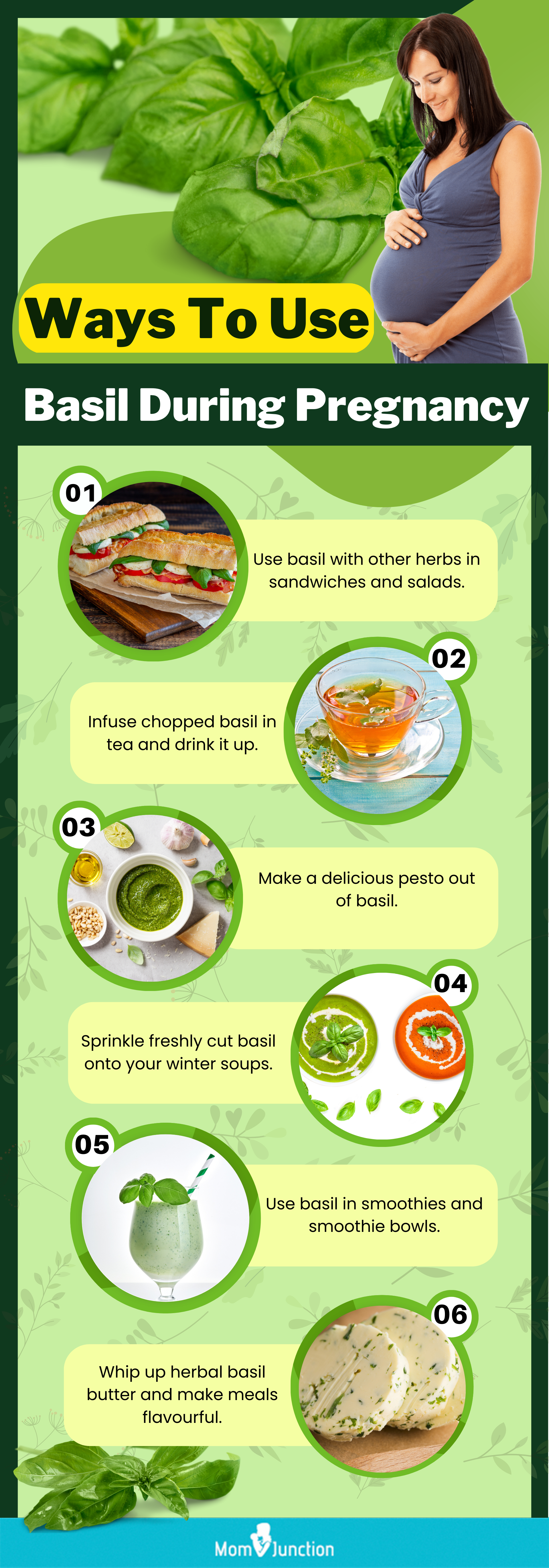
Illustration: Momjunction Design Team
Illustration: Is It Safe To Consume Tulsi (Holy Basil) During Pregnancy?
_during_pregnancy_illustration.jpg.webp)
Image: Stable Diffusion/MomJunction Design Team
References
- Marc Maurice Cohen; (2014); Tulsi – Ocimum sanctum: A herb for all reasons.
https://www.ncbi.nlm.nih.gov/pmc/articles/PMC4296439/ - Basil; Clemson University
https://hgic.clemson.edu/?fs=1327 - Robert Tisserand and Rodney Young; (2013); Essential Oil Safety.
https://books.google.co.in/books?id=DbEKAQAAQBAJ&pg=PA208&dq=basil+blood+clotting&hl=en&sa=X&ved=0CBwQ6AEwAGoVChMI6LfSrraZxwIV0EuOCh09XABw#v=onepage&q=basil%20blood%20clotting&f=false - Susheela Raghavan; (2006); Handbook of Spices, Seasonings, and Flavorings.
https://books.google.co.in/books?id=m4vvs87XiucC&pg=PA72&dq=basil+contains+vitamin+A&hl=en&sa=X&ved=0CB0Q6AEwAGoVChMIpsHl6raZxwIVWAuOCh2BsgyV#v=onepage&q=basil%20contains%20vitamin%20A&f=false - Dr. Mayank S. Vora; (2015); Rasayana: the Fountain of Life.
https://books.google.co.in/books?id=xqIVCgAAQBAJ&pg=PT94&dq=basil+contains+manganese&hl=en&sa=X&ved=0CBwQ6AEwAGoVChMIqfb4zLaZxwIV0AWOCh0JQAto#v=onepage&q=basil%20contains%20manganese&f=false - The Benefits of Holy Basil (Tulsi); Cleveland Clinic
https://health.clevelandclinic.org/benefits-of-holy-basil - Fabulous Health Benefits Of Tulsi; The Arya Vaidya Chikitsalayam & Research Institute.
https://www.avcri.org/post/uncovering-the-powerful-10-health-benefits-of-tulsi-leaf-uses-nutritional-value-and-more - Mahdieh Ahmadifard et al.; (2020); The Efficacy of Topical Basil Essential Oil on Relieving Migraine Headaches: A Randomized Triple-Blind Study.
https://karger.com/cmr/article-abstract/27/5/310/67613/The-Efficacy-of-Topical-Basil-Essential-Oil-on?redirectedFrom=fulltext - Vinod Kumar et al.; (2011); Pharmacological Review on Ocimum sanctum Linnaeus: A Queen of herbs
https://citeseerx.ist.psu.edu/document?repid=rep1&type=pdf&doi=93762406951d7288317a9d807a04a5dc93e96157 - Denys J. Charles; (2013); Antioxidant Properties of Spices Herbs and Other Sources
https://books.google.co.in/books?id=Tz4Fa7r9wgIC&pg=PA178&dq=basil+hypoglycemic+effect&hl=en&sa=X&ved=0CCIQ6AEwAWoVChMIp6b9i7aZxwIVEXKOCh2F9A7l#v=onepage&q=basil%20hypoglycemic%20effect&f=false - Merrily A. Kuhn and David Winston; (2012); Winston & Kuhn’s Herbal Therapy and Supplements
https://books.google.co.in/books?id=gd4PAAAAQBAJ&pg=PA261&dq=basil+safe+in+pregnancy&hl=en&sa=X&ved=0CCMQ6AEwAWoVChMIz8b55rWZxwIVggeOCh0xGwch#v=onepage&q=basil%20safe%20in%20pregnancy&f=false - Pregnancy Nutrition: What To Eat When Carrying Twins; Texas Health Resources
https://www.texashealth.org/Health-and-Wellness/Women-and-Infants/Pregnancy-Nutrition-What-To-Eat-When-Carrying-Twins - (Ocimum Tenuiflorum) on isolated mouse uterine muscles
https://www.phytojournal.com/archives/2022/vol11issue4/PartD/11-4-54-138.pdf
Community Experiences
Join the conversation and become a part of our nurturing community! Share your stories, experiences, and insights to connect with fellow parents.
Read full bio of Dr. Mona Hardas
Read full bio of Ria Saha
Read full bio of Swati Patwal
Read full bio of Lorraine Teron











